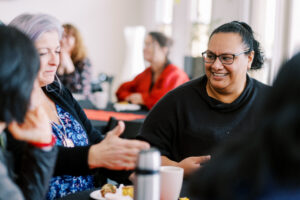Make No Mistake – Toxic Controlling Relationships Aren’t Loving
Healthy relationships don’t smother and dominate the other person. Loving relationships are about looking out for the other person. Controlling others is like putting them in chains to restrict their movements.
In an excerpt from Dr Tim Clinton’s book, ‘Break Through, When to Give In, How to Push Back’ we can learn how these often toxic and controlling relationships are not loving, but instead are a sad and twisted misinterpretation.
10 Signs of an Unhealthy Relationship
“I’d die without you.”
“You make me whole.”
“Without you, I’d be hopelessly lost.”
“You define me.”
These phrases may sound charming, but this kind of “love” can actually be very destructive. In the name of “love,” it’s easy to put up with all kinds of craziness. To make excuses. To ignore reality.
When we define love as dominance, we feel completely justified in smothering people with too much attention and direction. And when we define love as compliance, we feel so utterly incompetent that we’re happy to let an assertive person tell us how to live. However, such misguided devotion doesn’t truly satisfy us. It robs us of sanity, peace, joy and the true love of a healthy relationship.
So how do you know? Here are a few signs that you may be in an unhealthy, enmeshed relationship. Do you…
- Close your eyes to irresponsible behaviour?
- Keep secrets or tolerate abuse?
- Sacrifice to cover up someone else’s mistakes?
- Cater to a lazy person’s whims?
- Caving into an angry person’s demands?
- Make excuses?
- Justify bad behaviour?
- Accept the blame for something you never did?
- Enable an addiction?
- Lie to yourself or others?
If you answered “yes” to many of these statements, it’s likely that you may be stuck in an enmeshed relationship. These relationships leave a legacy of heartbreak and manipulation. But that legacy can be changed if we are willing to open our eyes and take an honest look at ourselves and our relationships.
Often, in the name of love, we bail out people who won’t help themselves. Each time we insist, “This is the last time!”
In the name of love, we endure name-calling, the silent treatment, temper tantrums, even violence. We try to assure ourselves, “Deep down he’s a good person with a kind heart…he’ll change.” But he never really does. In the name of love, we cower in the face of an angry person’s demands and settle for whatever peace we can get, which isn’t much.
Why? What keeps us there? A misunderstanding of love.
What the world calls “love” often isn’t true love at all. If our version of love is destroying us and someone we care about, and then let’s not call it love. There are lots of other names for it, but it’s not love.
We may call it love, but enmeshment is:
- Smothering a weak, needy person with too much attention and direction
- Giving in (meekly or defiantly) to the demands of a dominating person
- Taking responsibility for another’s choices instead of letting him experience the consequences of his decisions
- Losing your identity in someone else, being dominated by them, and taking on that person’s emotions, values, thoughts and behaviours
- Switching roles with your children and expecting them to meet your emotional needs
- Building your relationship on power instead of mutual respect
If you’ve been mistaking counterfeit love for the real thing, then you need a breakthrough—a flash of insight and a dose of courage to take action and change the status quo. A weak, misguided definition of love causes us to give in repeatedly, but a stronger, more accurate view of love directs us to speak and act wisely to address evil, manipulative behaviour…”
God’s Version of love is found in 1 Corinthians 13:4-7
“Love is patient, love is kind. It does not envy, it does not boast, it is not proud. 5 It does not dishonour others, it is not self-seeking, it is not easily angered, it keeps no record of wrongs. 6 Love does not delight in evil but rejoices with the truth. 7 It always protects, always trusts, always hopes, and always perseveres.”
Sources:
Permission Attained – Dr Tim Clinton – http://www.timclinton.com




Have you thought about becoming a qualified counsellor? It’s a great opportunity to learn how you can extend God's love and grace to the hurting out in the community.
For those who would like to enrol in aifc’s accredited Christian counselling courses we have two intakes per year for courses commencing around the following months:
Enrolment Season - opens approximately 2 months prior to our courses commencing. Enrol online here during our enrolment season.
We also offer two modes of study:
A Master of Counselling course was introduced in 2018.